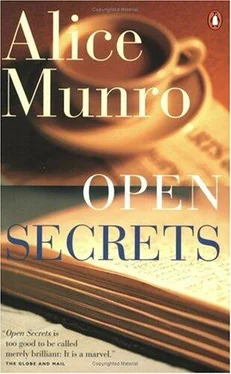We invited Sylvia and Nelson upstairs for dinner, and Sylvia told us about the tiny town they both came from, in Northern Ontario. She said that Nelson had always been the smartest person in their class and in their school and possibly in the whole town. When she said this, Nelson looked at her with a perfectly flat and devastating expression, an expression that seemed to be waiting with infinite patience and the mildest curiosity for some explanation, and Sylvia laughed and said, “Just kidding, of course.”
When Sylvia was working late shifts at the hospital, I sometimes asked Nelson to share a meal with us in a more informal way. We got used to his silences and his indifferent table manners and to the fact that he did not eat rice or noodles, eggplant, olives, shrimp, peppers, or avocados, and no doubt a lot of other things, because those had not been familiar foods in the town in Northern Ontario.
Nelson looked older than he was. He was short and sturdily built, sallow-skinned, unsmiling, with a suggestion of mature scorn and handy pugnaciousness laid over his features, so that it seemed he might be a hockey coach, or an intelligent, uneducated, fair-minded, and foul-mouthed foreman of a construction gang, rather than a shy, twenty-two-year-old student.
He was not shy in love. I found him resourceful and determined. The seduction was mutual, and it was a first affair for both of us. I had once heard somebody say, at a party, that one of the nice things about marriage was that you could have real affairs — an affair before marriage could always turn out to be nothing but courtship. I was disgusted by this speech, and frightened to think that life could be so bleak and trivial. But once my own affair with Nelson started, I was amazed all the time. There was no bleakness or triviality about it, only ruthlessness and clarity of desire, and sparkling deception.
Nelson was the one who first faced up to things. One afternoon he turned on his back and said hoarsely and defiantly, “We are going to have to leave.”
I thought he meant that he and Sylvia would have to leave, they could not go on living in this house. But he meant himself and me. “We” meant himself and me. Of course he and I had said “we” of our arrangements, of our transgression. Now he had made it the “we” of our decision — perhaps of a life together.
My thesis was supposed to be on Mary Shelley’s later novels, the ones nobody knows about. Lodore, Perkin Warbeck, The Last Man . But I was really more interested in Mary’s life before she learned her sad lessons and buckled down to raising her son to be a baronet. I loved to read about the other women who had hated or envied or traipsed along: Harriet, Shelley’s first wife, and Fanny Imlay, who was Mary’s half-sister and may have been in love with Shelley herself, and Mary’s stepsister, Mary Jane Clairmont, who took my own name — Claire — and joined Mary and Shelley on their unwed honeymoon so that she could keep on chasing Byron. I had often talked to Donald about impetuous Mary and married Shelley and their meetings at Mary’s mother’s grave, about the suicides of Harriet and Fanny and the persistence of Claire, who had a baby by Byron. But I never mentioned any of this to Nelson, partly because we had little time for talk and partly because I did not want him to think that I drew some sort of comfort or inspiration from this mishmash of love and despair and treachery and self-dramatizing. I did not want to think so myself. And Nelson was not a fan of the nineteenth century or the Romantics. He said so. He said that he wanted to do something on the Muckrakers. Perhaps he meant that as a joke.
Sylvia did not behave like Harriet. Her mind was not influenced or impeded by literature, and when she found out what had been going on, she went into a wholesome rage.
“You blithering idiot,” she said to Nelson.
“You two-faced twit,” she said to me.
The four of us were in our living room. Donald went on cleaning and filling his pipe, tapped it and lit it, nursed and inspected it, drew on it, lit it again — all so much the way someone would do in a movie that I was embarrassed for him. Then he put some books and the latest copy of Maclean’s into his briefcase, went to the bathroom to get his razor and to the bedroom to get his pajamas, and walked out.
He went straight to the apartment of a young widow who worked as a secretary at his clinic. In a letter he wrote to me later, he said that he had never thought of this woman except as a friend until that night, when it suddenly dawned on him what a pleasure it would be to love a kind and sensible, unwracked-up sort of person.
Sylvia had to be at work at eleven o’clock. Nelson usually walked her over to the hospital — they did not have a car. On this night she told him that she would rather be escorted by a skunk.
That left Nelson and me alone together. The scene had lasted a much shorter time than I had expected. Nelson seemed gloomy but relieved, and if I felt that short shrift had been given to the notion of love as a capturing tide, a glorious and harrowing event, I knew better than to show it.
We lay down on the bed to talk about our plans and ended up making love, because that was what we were used to doing. Sometime during the night Nelson woke up and thought it best to go downstairs to his own bed.
I got up in the dark, dressed, packed a suitcase, wrote a note, and walked to the phone at the corner, where I called a taxi. I took the six-o’clock train to Toronto, connecting with the train to Vancouver. It was cheaper to take the train, if you were willing to sit up for three nights, which I was.
So there I sat, in the sad, shambling morning in the day coach, coming down the steep-walled Fraser Canyon into the sodden Fraser Valley, where smoke hung over the small, dripping houses, the brown vines, the thorny bushes and huddled sheep. It was in December that this earthquake in my life had arrived. Christmas was cancelled for me. Winter with its snowdrifts and icicles and invigorating blizzards was cancelled by this blurred season of muck and rain. I was constipated, I knew that I had bad breath, my limbs were cramped, and my spirits utterly bleak. And did I not think then, What nonsense it is to suppose one man so different from another when all that life really boils down to is getting a decent cup of coffee and room to stretch out in? Did I not think that even if Nelson were sitting here beside me, he would have turned into a gray-faced stranger whose desolation and unease merely extended my own?
No. No. Nelson would still be Nelson to me. I had not changed, with regard to his skin and his smell and his forbidding eyes. It seemed to be the outside of Nelson which came most readily to my mind, and in the case of Donald it was his inner quakes and sympathies, the labored-at kindness and those private misgivings that I had got knowledge of by wheedling and conniving. If I could have my love of these two men together, and settle it on one man, I would be a happy woman. If I could care for everybody in the world as minutely as I did for Nelson, and as calmly, as uncarnally as I now did for Donald, I would be a saint. Instead, I had dealt a twofold, a wanton-seeming, blow.
The regular customers who had changed into something like friends were: a middle-aged woman who was a chartered accountant but preferred such reading as Six Existentialist Thinkers , and The Meaning of Meaning; a provincial civil servant who ordered splendid, expensive works of pornography such as I had not known existed (their elaborate Oriental, Etruscan connections seemed to me grotesque and uninteresting, compared to the simple, effective, longed-for rituals of myself and Nelson); a Notary Public who lived behind his office at the foot of Johnson Street (“I live in the slums,” he told me. “Some night I expect a big bruiser of a fellow to lurch around the corner hollering ‘ Ste-el-la. ’ ”); and the woman I knew later as Charlotte — the Notary Public called her the Duchess. None of these people cared much for one another, and an early attempt that I made to bring the accountant and the Notary Public into conversation was a fizzle.
Читать дальше












